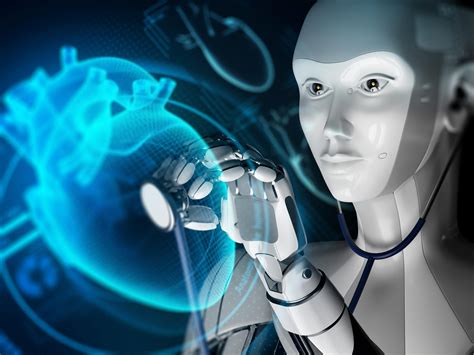Artificial Intelligence (AI) has become increasingly pervasive in our lives, revolutionizing the way we interact with technology and the world around us. From powering virtual assistants and self-driving cars to revolutionizing healthcare and finance, AI has undoubtedly transformed the way we live, work, and play.
In this blog post, we’ll take a deep dive into the fascinating world of AI, starting with an introduction to its broad scope and potential impact. We’ll explore the foundational concepts of machine learning and how it drives the capabilities of AI, as well as delve into the cutting-edge field of deep learning, which is pushing the boundaries of what AI can achieve.
We’ll also discuss how AI is making strides in understanding human language through natural language processing and gaining the ability to see and interpret the visual world through computer vision. Furthermore, we’ll examine the exciting prospects of integrating AI with robotics, and its potential to elevate industries such as healthcare and finance.
Finally, we’ll address the ethical considerations that come with AI development and speculate on the future of this groundbreaking technology. Join us on this journey as we unravel the field of artificial intelligence and its transformative potential.
Table of Contents
Introduction to Artificial Intelligence
Artificial Intelligence (AI) is a field of computer science that aims to create machines with the ability to perform tasks that would typically require human intelligence. This includes tasks such as visual perception, speech recognition, decision-making, and language translation. The goal of AI is to develop systems that can learn, reason, and adapt based on the data they receive, ultimately mimicking human cognition.
AI has become increasingly important in various industries, from healthcare to finance, and has the potential to revolutionize the way we live and work. The rapid advancements in technology have led to the widespread integration of AI-powered solutions in our daily lives, from virtual assistants like Siri and Alexa to self-driving cars and personalized recommendations on streaming platforms.
With the increasing complexity and capabilities of AI, it is crucial to understand the principles and challenges associated with its development and implementation. Ethical considerations, privacy concerns, and the potential impact on the job market are all important factors to consider as AI continues to advance.
As we delve into the world of AI, it is important to explore the various subfields that contribute to the overall concept of artificial intelligence, such as machine learning, deep learning, natural language processing, and computer vision. Each of these areas plays a crucial role in the development and application of AI, shaping the future of technology and innovation.
How Machine Learning Powers Artificial Intelligence
Machine learning plays a crucial role in powering artificial intelligence, allowing machines to learn from data and improve their performance over time. One of the key advantages of machine learning is its ability to analyze large amounts of data and identify patterns, which is essential for AI to make predictions and decisions.
By using various algorithms and statistical models, machine learning enables AI systems to recognize patterns, make recommendations, and even understand natural language. This is essential for applications such as virtual assistants, chatbots, and recommendation systems, where AI needs to understand and respond to human input.
Furthermore, machine learning powers AI through techniques such as supervised learning, unsupervised learning, and reinforcement learning, allowing AI models to continuously improve and adapt to new data and environments.
In essence, machine learning provides the foundation for artificial intelligence to process, analyze, and derive insights from data, ultimately driving the development and advancement of intelligent systems across various industries.
Deep Learning: Pushing the Boundaries of AI
Deep Learning is a subset of Artificial Intelligence which has been making significant strides in recent years, pushing the boundaries of AI and enabling machines to perform tasks that were previously thought to be beyond their capabilities. One of the key features of Deep Learning is its ability to automatically learn representations of data directly from the data itself, without the need for human input or intervention.
This has led to breakthroughs in areas such as image and speech recognition, natural language processing, and even autonomous driving. Through the use of neural networks with multiple layers, deep learning models can learn to extract higher-level features from raw data, allowing them to make more accurate predictions and decisions.
One of the biggest advantages of Deep Learning is its ability to handle large volumes of data and learn from it in a way that traditional machine learning algorithms cannot. This has made deep learning particularly well-suited to tasks such as image and speech recognition, where the data can be complex and diverse.
As Deep Learning continues to advance, it is expected to have profound implications for a wide range of industries, from healthcare and finance to manufacturing and transportation. The ability of deep learning models to process and interpret vast amounts of data will enable businesses to make more informed decisions, improve efficiency, and even develop new products and services.
Natural Language Processing: Understanding Human Language
When we think of communication, we often think of spoken or written language. Natural language processing (NLP), a field of artificial intelligence (AI), aims to bridge the gap between human communication and computer understanding. NLP focuses on the interaction between computers and human language, enabling machines to interpret and respond to natural language data.
NLP utilizes machine learning algorithms to analyze and understand human language. Through the use of text analysis, computational linguistics, and linguistic semantics, NLP allows machines to comprehend the meaning behind words, sentences, and overall human communication.
As technology continues to advance, so does the complexity and capabilities of NLP. From virtual assistants that respond to voice commands to language translation tools that provide real-time communication across different languages, NLP has become an integral part of modern technology.
Understanding human language is critical in enabling machines to communicate, interact, and assist with various tasks. NLP plays a crucial role in chatbots, sentiment analysis, and automated customer support, allowing businesses to provide efficient and personalized interactions with their customers.
Computer Vision: Giving Machines the Power of Sight
Computer vision is a field of artificial intelligence that focuses on enabling machines to interpret and understand the visual world. Through the use of computer vision technology, machines are able to analyze and make sense of visual information, much like the human brain does. This capability allows machines to see and comprehend the world around them, opening up a wide range of possibilities for applications in various industries.
One of the key components of computer vision is image recognition, which involves teaching machines to identify and categorize objects, people, places, and other visual elements within an image or video. This process often involves using machine learning algorithms to train the system to recognize patterns and features within visual data, allowing for accurate and reliable object detection and recognition.
Computer vision technology has numerous practical applications, from enabling smart cameras and surveillance systems to assisting in medical imaging and diagnostics. In the automotive industry, computer vision plays a crucial role in the development of self-driving vehicles, allowing cars to see and navigate their surroundings with precision and safety. Additionally, computer vision is used in retail and e-commerce for tasks such as inventory management, product recommendations, and augmented reality experiences.
As technology continues to advance, the capabilities of computer vision are expected to expand even further, with the potential to revolutionize fields such as healthcare, manufacturing, and entertainment. With its ability to give machines the power of sight, computer vision is poised to significantly impact the way we interact with and benefit from artificial intelligence in the future.
Robotics and Artificial Intelligence: A Perfect Match
Robotics and Artificial Intelligence (AI) have long been seen as the perfect match, combining the power of machines with the intelligence of algorithms to create highly advanced and efficient systems. The integration of robotic technology with AI has revolutionized various industries, from manufacturing and healthcare to transportation and entertainment.
One of the major benefits of combining robotics with AI is the ability to create autonomous systems that can perform tasks with precision and accuracy. From self-driving cars and drones to robotic arms in manufacturing plants, AI-powered robots have the potential to streamline processes and improve efficiency.
Furthermore, the use of AI in robotics enables robots to adapt to changing environments, learn from experience, and make decisions based on complex data. This level of intelligence allows robots to perform tasks that were once considered too complex or dangerous for machines, opening up new possibilities in fields such as space exploration, disaster response, and healthcare.
Overall, the synergy between robotics and artificial intelligence continues to push the boundaries of what is possible, paving the way for a future where intelligent machines work alongside humans to accomplish tasks that were once thought to be beyond the capabilities of technology.
Integrating AI in Industries: Transforming Healthcare
Artificial Intelligence (AI) has been making significant advancements in various industries, and one of its most promising applications is in transforming healthcare. By integrating AI into healthcare systems, the industry is experiencing a revolution that is improving the quality of patient care, increasing efficiency, and reducing costs.
One of the ways AI is transforming healthcare is through predictive analytics. AI-powered algorithms can analyze vast amounts of patient data to identify patterns and predict potential health issues before they become critical. This proactive approach allows healthcare providers to intervene early, leading to better outcomes for patients.
Another area where AI is making a significant impact is in medical imaging. AI algorithms can analyze medical images such as X-rays, MRIs, and CT scans with a level of accuracy and speed that surpasses human capabilities. This not only helps in diagnosing diseases more accurately but also enables healthcare providers to make treatment decisions more efficiently.
In addition to predictive analytics and medical imaging, AI is also being used to personalize patient care. By analyzing patient data and behavior, AI systems can provide personalized treatment plans and recommendations, leading to better patient outcomes. This personalized approach is revolutionizing the way healthcare is being delivered and has the potential to significantly improve patient satisfaction.
AI in Finance: Boosting Efficiency and Accuracy
Artificial Intelligence (AI) has completely transformed the landscape of the finance industry by introducing innovative solutions that boost efficiency and accuracy. With the power of machine learning and data analysis, AI has revolutionized the way financial institutions operate and serve their customers.
By leveraging AI, financial organizations are able to streamline their operations, automate repetitive tasks, and make informed decisions based on real-time data. This not only improves the overall efficiency of the industry but also enhances the accuracy and reliability of financial processes.
One of the key areas where AI has made a significant impact in finance is fraud detection and prevention. Through advanced algorithms and predictive analytics, AI systems can identify and flag suspicious activities, minimizing the risk of fraudulent transactions and protecting the financial interests of both institutions and customers.
Furthermore, AI-powered solutions are also being used for personalized customer service, risk management, investment strategies, and compliance monitoring, all of which contribute to the efficiency and accuracy of financial operations.
Ethical Considerations in AI Development
As AI technology continues to advance at a rapid pace, it is important to consider the ethical implications of its development. Artificial Intelligence has the potential to revolutionize the way we live and work, but it also raises significant ethical concerns that must be addressed. One of the key ethical considerations in AI development is the potential for bias in machine learning algorithms. These algorithms are often trained on large datasets of historical information, which can reflect and perpetuate existing biases in society.
Another ethical consideration is the impact of AI on employment and the future of work. As AI technology becomes more advanced, there is a concern that it could replace certain jobs and industries, leading to widespread unemployment and economic disruption. It is important for developers and policymakers to consider the potential social and economic impact of AI and to develop strategies for ensuring a smooth transition to the AI-driven future.
Privacy is also a major ethical concern in AI development. AI systems are capable of collecting, analyzing, and storing massive amounts of data about individuals, raising significant concerns about data privacy and security. It is crucial for developers to prioritize the protection of personal information and to ensure that AI systems are designed and implemented in a way that respects individual privacy rights.
Finally, there are ethical considerations surrounding the use of AI in weaponized systems and military applications. The development of autonomous weapons and AI-powered warfare raises complex moral and ethical questions about the use of lethal force and the potential for unintended consequences. It is essential for developers, policymakers, and society as a whole to engage in discussions and debates about the ethical implications of AI in war and to establish clear boundaries and regulations for the use of AI in military contexts.
The Future of Artificial Intelligence
Artificial Intelligence (AI) has made significant strides in recent years, and its future potential is incredibly exciting. As technology continues to advance, we can expect AI to become even more integrated into our daily lives, revolutionizing industries and changing the way we live and work.
In the coming years, AI is poised to play a crucial role in shaping the future of healthcare. From personalized treatment plans to predictive analytics, AI has the potential to improve patient outcomes and streamline healthcare processes.
Furthermore, the financial sector will also see a major impact from AI. With the ability to analyze large amounts of data at unprecedented speeds, AI can revolutionize risk assessment, fraud detection, and customer service in the finance industry.
As AI continues to evolve, it will be important to consider the ethical implications of its development and use. Ensuring that AI is used responsibly and ethically will be crucial in shaping the future of this powerful technology.





